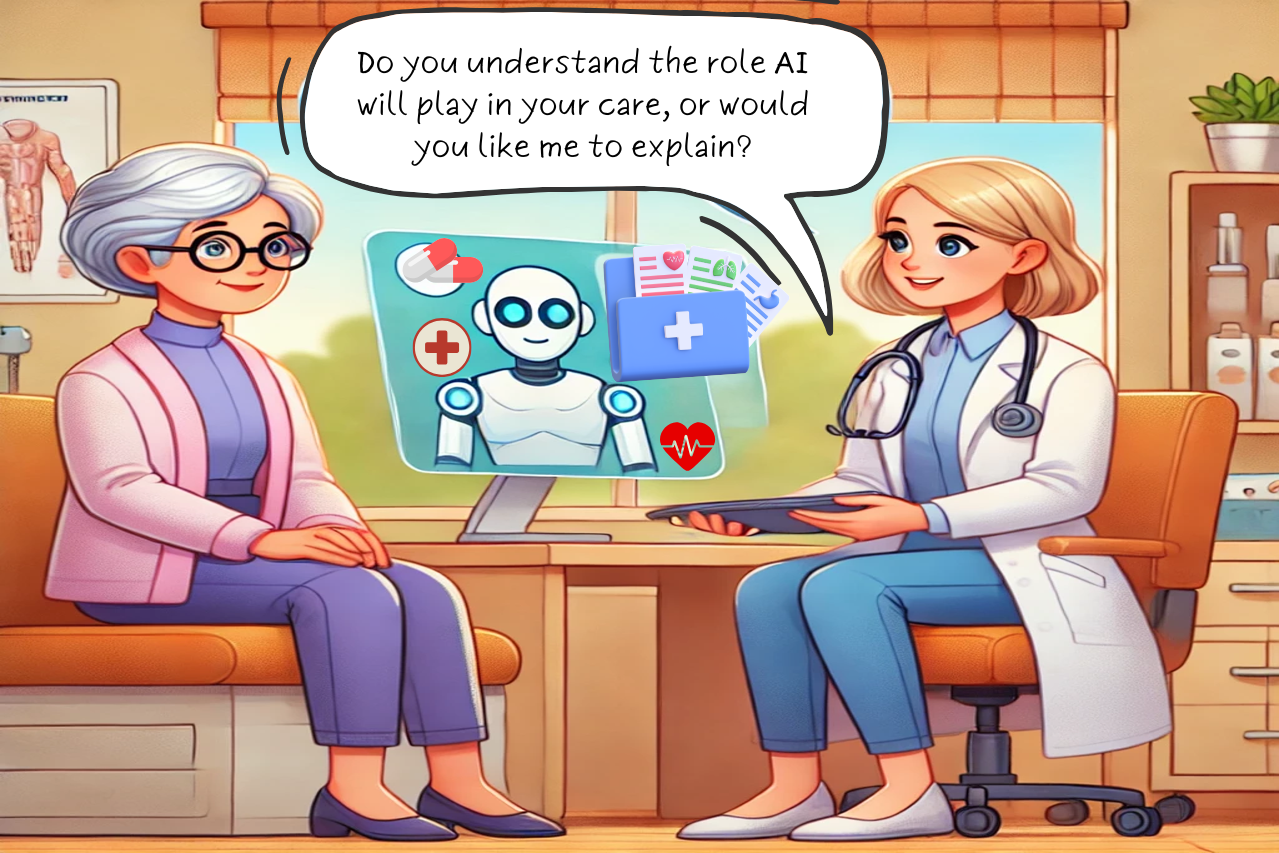The promise of artificial intelligence (AI) in healthcare has been one of the most exciting technological advancements in recent years. AI has the potential to revolutionize the way we diagnose diseases, deliver treatments, and improve patient outcomes. However, for AI to reach its full potential, especially in diverse healthcare environments, it needs to be adaptable and generalizable. In other words, AI systems must be designed not only to excel in specific, controlled conditions but also to perform reliably across a wide range of settings, populations, and clinical needs.
What is Generalizability in AI?
Generalizability refers to an AI system’s ability to perform well when applied to new, unseen data that may differ from the data it was trained on. In healthcare, this means that an AI model developed using a specific dataset—such as one from a particular hospital, region, or demographic group—should be able to adapt and deliver accurate results when applied to different hospitals, regions, or patient populations.
In contrast, AI systems that lack generalizability may work well in one clinical setting but fail to perform adequately when transferred to another. This can lead to inaccurate diagnoses, inappropriate treatment recommendations, and even harmful outcomes for patients.
Why Generalizability Matters in Healthcare
Healthcare is inherently diverse. Diseases manifest differently in various populations due to genetic, environmental, and socioeconomic factors. Treatment protocols also vary depending on available resources, local practices, and cultural contexts.
For example, when it comes to healthcare, there’s a stark contrast between high-income and low-income countries. While AI technologies have the potential to revolutionize patient care, a recent article from Nature.com titled “Generalizability assessment of AI models across hospitals in a low-middle and high-income country” highlights a significant challenge: AI models that perform well in high-income settings may not translate effectively in low-income environments.
The article highlights critical insights regarding AI models and their applicability across different healthcare contexts. It examines how AI models developed in high-income countries may not perform as effectively when deployed in low or middle-income countries. This discrepancy is primarily attributed to differences in healthcare infrastructure, patient demographics, and clinical practices. Making generalizability a crucial requirement for AI in healthcare.
Variability in Patient Populations:
Like most things in life, one size doesn’t fit all. AI models trained on data from one demographic may not accurately predict outcomes for patients from different backgrounds. A 2021 study published in The Lancet Digital Health revealed that many AI models for diagnosing skin conditions, such as melanoma, were less accurate when applied to darker skin tones because they had been trained primarily on data from lighter-skinned individuals.
Without diverse training data and robust generalizability, AI tools can unintentionally perpetuate existing healthcare disparities. The study emphasizes the need for models to be trained on diverse datasets that reflect the variability of patient populations across different settings.
Contextual Factors:
Healthcare doesn’t operate in a vacuum. Factors like available resources, cultural practices, and local healthcare policies can greatly influence patient care. AI models need to account for these contextual differences to be effective across various settings. Treatment protocols, diagnostic tools, and workflows vary significantly based on resources and expertise. AI systems that are not generalizable may struggle to adapt to these differences.
For example, a machine learning model trained to optimize surgical workflows in a high-resource hospital with advanced technology may not translate well to a rural hospital with limited resources. Generalizable AI must be flexible enough to work in diverse clinical environments, ensuring that all patients, regardless of location, benefit from AI-driven insights.
Performance Metrics:
The assessment of AI models should go beyond traditional performance metrics like accuracy. It should also include evaluations of how well these models generalize to new populations, particularly in low and middle-income countries where healthcare needs may differ significantly. Additionally, medical knowledge is constantly evolving, and AI systems must keep up with new guidelines, treatments, and disease patterns.
A system trained on data from years ago may not reflect the latest best practices, leading to suboptimal care. For example, the COVID-19 pandemic introduced entirely new patterns of disease, treatments, and hospital workflows. AI systems that were highly specialized for pre-pandemic conditions had to be re-adapted or replaced. Generalizability allows AI to adapt to these changes more effectively, ensuring that the technology continues to be relevant and beneficial as healthcare landscapes evolve.
The Challenges of Achieving Generalizability
Achieving generalizability in AI, especially in healthcare, is not without challenges. Some of the key barriers include:
1. Limited and Biased Training Data
Many AI models are trained on data from a narrow segment of the population or from specific healthcare institutions. If the training data lacks diversity, the AI system is unlikely to perform well in different contexts. For example, an AI tool designed to predict complications in diabetic patients may struggle when applied to patients with different comorbidities or from underserved populations.
One solution is to increase the diversity of training datasets. Incorporating data from multiple hospitals, countries, and demographic groups can help create more robust models. However, assembling these datasets requires overcoming technical, regulatory, and ethical challenges related to data sharing and patient privacy.
2. Overfitting
Overfitting occurs when an AI model becomes too tailored to the specific data it was trained on, making it less effective when faced with new data. This is a common issue when developing AI for healthcare. To counteract overfitting, developers can use techniques such as cross-validation, where models are tested on multiple datasets, or ensemble learning, where multiple models are combined to improve generalizability.
3. Complexity of Healthcare Data
Healthcare data is often messy and complex, with inconsistencies, missing information, and variations in how conditions are diagnosed or treated. AI models need to be sophisticated enough to handle this variability while still delivering reliable results across different settings. This is why developing generalizable AI for healthcare requires collaboration between AI developers, healthcare professionals, and data scientists who understand the nuances of clinical data.
The Path Forward: Building Generalizable AI for Healthcare
To build AI systems that are generalizable and adaptable to diverse healthcare needs, several strategies must be embraced:
- Diverse and Inclusive Datasets: Increasing the diversity of training datasets is essential. AI systems need to learn from a wide range of patient populations, clinical practices, and healthcare settings. Collaborative efforts between healthcare institutions, AI developers, and governments can help facilitate access to diverse data while ensuring patient privacy.
- Continuous Learning: Healthcare AI should incorporate mechanisms for continuous learning, allowing models to update and refine themselves as they encounter new data or environments. This would enable AI systems to adapt to evolving healthcare landscapes and maintain their accuracy over time.
- Rigorous Validation: AI systems should be rigorously tested across multiple environments and patient populations before deployment. Validation in real-world clinical settings ensures that the AI performs reliably outside of controlled research conditions.
- Interdisciplinary Collaboration: Collaboration between AI developers, healthcare providers, and researchers is crucial. AI models should be designed with input from medical professionals who understand the diversity of clinical practice and patient needs. This collaborative approach can help ensure that AI systems are both effective and ethical.
As AI becomes more integrated into healthcare, its ability to generalize across diverse populations, settings, and conditions will determine its overall success. Building generalizable AI is essential for ensuring that all patients benefit from this transformative technology, regardless of their background or where they receive care.
By prioritizing diversity in training data, implementing continuous learning, and collaborating across disciplines, we can create AI systems that are adaptable, equitable, and effective in meeting the diverse needs of healthcare around the world.
Generalizability isn’t just a technical requirement for AI—it’s a necessity for advancing healthcare that is fair, inclusive, and accessible to all.




